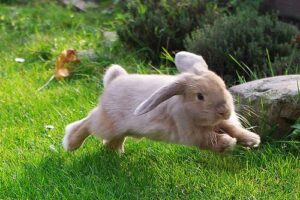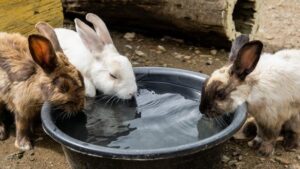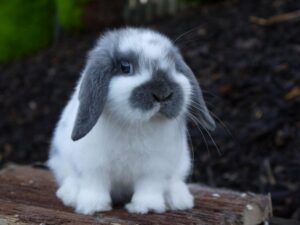Pet rabbits are one of the most popular pets around the world, they are friendly, cuddly, and can be kept both indoors as house rabbits or outdoors in a shed or in a hutch. Even though they are a popular outdoor pet, they are quite susceptible to cold weather.
If you are someone who has pet rabbits or planning on getting one then you must have wondered how to keep pet rabbits warm during the winter?
You can keep your rabbits indoors, provide warm bedding, insulate their hutch, add a heating pad to their cage or install a heating lamp.There are many different ways to keep pet rabbits warm during the winter which we are going to discuss the in a bit more detail below and provide the best solution for your rabbits.
Keep Your Rabbits Indoors
Perhaps the easiest way to keep your pet rabbits warm during the winter is to house them indoors. Rabbits can be great house pets that can easily live inside the house. They are clean, they can easily be litter trained and bond nicely with both children and other house pets.

Keeping your rabbits indoors, especially during the winter can ideal if you have some free space in a spare room or in your garage, anywhere which stays warm for your rabbits.
Ideal Living Temperature For Pet Rabbits?
Normal body temperature for pet rabbits is around 98° F. (36.6° C.) to 102° F. (38.9° C.) but they can tolerate temperatures ranging anywhere from 40 °F (5 °C) to 86 °F (30 °C).
That being said the do best in room temperatures similar to what we humans prefer 68 °F (20 °C) to 77 °F (20 °C). Anything that you feel comfortable with should be good enough for your rabbits.
Rabbits are more well suited to colder temperatures then warm temperatures. Some breeds have thick fur that can protect them from even freezing colds. Rabbits also grow a thicker coat of fur that keeps them warm during the winter months.
How To House Rabbits Indoors?
Housing rabbits indoors can be quite convenient for folks who have just one or two rabbits. Rabbits make excellent house pets, they can live happily in indoor temperatures and contrary to popular belief, rabbits live healthier and longer life when kept indoors.
So if housing rabbits indoors is something that you might want to learn a bit more about then check out our article The Ultimate New Rabbit Checklist For Bunny Beginners and Top 5 Best Indoor Rabbit Cages Of 2020.
Use Warm Bedding During Winter
Rabbits tend to loose a lot of their body heat through the cold floor of the cage while they sleep. The best way to prevent this is and keep rabbits warm during the winter is to provide a thick layer of bedding on the floor of their cage or hutch and making sure that it remains dry at all times.
A good layer of bedding adds much needed insulation that keeps the rabbits away from the cold ground as well as preventing heat from escaping. This makes it more comfortable for your rabbits during the cold months.
Using Hay As Bedding
Hay has been the age old bedding choice for rabbit cages. We all know know that hay is quite essential for rabbits as a staple food source, as litter, bedding and even as toys. Most rabbit owners have a good supply of hay at hand so if you want to use hay as a bedding for rabbits then there is no need to go out and buy anything else.
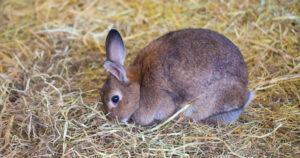
The best way to use hay is to lay it down in layers a until it is a couple of inches thick on the floor of the rabbit cage. Just make sure that the hay stays dry and mold free. Change the bedding every few days or when it has degraded.
Using hay for your rabbit’s bedding can be accessible and cost effective way to prevent low temperatures in your rabbit’s enclosure as well as help keep the rabbits warm in the winter.
Best Rabbit Bedding For Winter
If you live somewhere where the temperature dips below the freezing point then you may want to consider a commercial bedding product that may be more comfortable for your rabbits compared to just plain hay.
Commercial bedding is designed to stay dry, remove any pee smells, and keep your rabbits warm through the winter nights. Some of my favorite bedding products for pet rabbits are
Small Pet Select Natural Paper Bedding
- 100% Natural & Made in the USA.
- Made from recycled brown paper.
- Has no harmful chemicals or bleach.
- Soft and comfortable
- Less dust & loose fibers
- Made from natural raw paper fibers
Kaytee Clean & Cozy Extreme Odor Control
- Excellent odor control
- Absorbs 14x more liquid
- Dust free
Weather Proof The Rabbit Cage
If you house your rabbits outdoors in a shed or a hutch then weather proofing the enclosure before winter is of utmost importance.
Small repairs and improvements can make a ton of difference in the resident rabbit’s comfort. Some of the most important fixes and upgrades that you can do on your rabbit’s hutch before winter are as follows.
Remove Leaks From The Hutch Roof
The biggest factor when it comes to keeping your rabbit warm during the winter is making sure that they remain nice and dry throughout the day.
Rabbit fur is great at keeping the cold out. Rabbits have been hunted for centuries for their fur and in fact they were first domesticated so that we could have easy access to their fur and meat.
That being said, their fur is only good if it stays dry so make sure that there are no leaks on your rabbit’s hutch so that water does not seep through when the snow melts.
Get Them Off The Ground
As we discussed before, rabbits can quickly lose a lot of body warmth to the cold floor of their rabbit hutch.
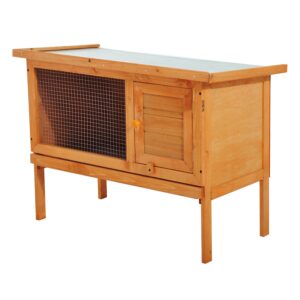
This can be made worse if you have non- insulating floor material like mesh. So the best ways to get your rabbits off the cold ground in winter are
- Build your rabbit hutch on a platform
- Get a multi-layered rabbit hutch
- Prop up the hutch on a few bricks
- Add wooden feet to your rabbit’s hutch
Reinforce The Framing
Another good step to take is to inspect and reinforce all the structural components of your rabbit’s hutch. If you live somewhere where there is heavy snowfall, the beams of your rabbit’s enclosure may get overloaded from the weight of all he snow on top.
Having the sturdy shelter for your rabbits ensures that they can stay warm inside without any risk of collapses. You can learn more about reinforcing a rabbit’s cage for on
Encourage The Rabbits To Exercise
Regular physical excessive is healthy for but us and our rabbits especially during the winter. Exercise helps to warm the body and helps keep the cold away in rabbits.
A rabbit’s workout may include running and hopping around, playing with toys and other pet animals as well as going up and down small inclines if possible.
https://youtu.be/IBrW5sOD5d4
Although it may be pretty hard to make your rabbit start exercising if they are are not used to it or do not enjoy it, but motivating them with treats always helps to get them going.
Make sure that your rabbit has enough space to move around in their enclosure so that they are not sedentary which may lead to them feeling cold.
Provide A Nutritious Diet
A rabbit’s diet can also be a big factor in keeping your pet rabbits warm during the winter. Depending on how cold it gets where you live, rabbits could need more calories or a different set of nutrients during the winter.
Monitor your rabbit’s weight and growth and adjust their diet during the winter accordingly. Here is a quick winter diet guide for your pet rabbits.
Rabbit Pellets
Rabbit pellets are calorie dense and provide for the bulk of your rabbit’s nutritional needs. Keep a bulk amount at the ready that can last you through the winter.
Monitor your rabbit’s weight and increase the portion of if you see that your rabbits are losing body weight but remember not to overfeed too many pellets as it can lead to obesity in pet rabbits.
Learn how much pellets a pet rabbit needs on How Much Pellets Should A Pet Rabbit Eat At Every Age?
Hay
Rabbit should have an unlimited supply of hay throughout the winter. It provides the dietary fiber that helps to keep their digestive system moving. Rabbits tend to consume more hay during the winter as their water intake decreases.
Rabbits need different types of hay depending on their age, for example young rabbits need alfalfa hay rich in protien but adult rabbits cannot eat that. Grown up rabbits eat a variety of orchard, meadow and timothy hay.
Learn more about rabbit rabbit hay on
Vegetables
Winter vegetables can be a real treat for pet rabbits. They provide a lot of vitamins, minerals and a good amount of other micro nutrients that are quite essential for pet rabbits. Some of the most common winter vegetables for pet rabbits are
- Spinach
- Lettuce
- Carrots
- Parsnips
- Fennel
- Cucumber
And a bunch more. Read a bit more about the perfect vegetables for rabbits on The Balanced Rabbit Diet Guide – Feeding Rabbits Simplified
Fruits
Seasonal fruits can also be a healthy part of your rabbit’s diet. They provide a lots of vital macro and micro nutrients that can be quite good for pet rabbits. But that being said, fruits also contain a lot of sugar which is really bad for rabbits as it causes stomach problems.
That being said some seasonal fruits given in small quantities once or twice a week perfectly healthy. Here are are few fruits that you can feed your rabbit during the winter.
- Apples
- Grapes
- Pear
- Peach
- Apricots
Again read up on the perfect fruits for pet rabbits on The Balanced Rabbit Diet Guide – Feeding Rabbits Simplified
Water
This is definitely the part of a rabbit’s winter diet that you need to keep a definite eye on. Rabbit tend to drink less during the winter which can lead to bouts of dehydration which is not good for a rabbit’s health.
If you house your rabbit’s outdoors and the temperature goes below then it can also freeze the water in your rabbit’s drinking bowls and bottles. This could lead to your rabbits not having access to any drinking water.
Check upon your pet rabbit’s drinking water everyday and make sure that they have clean drinking water at all times during the winter. You can learn a bit more about preventing your rabbit’s drinking water from freezing on How To Stop a Rabbit’s Water Bottle from Freezing
Install A Hutch Heater
Hutch heaters are various devices that can help to keep rabbits warm during the winter. Some operate by electricity while others do not. These devices can really be essential if you live somewere with really cold temperature which stay need the freezing point.
Here are are some of the most popular hutch heaters on amazon. Check them out and decide which one will suit your rabbit cage the best.
K&H Pet Products Electric Small Animal Heated Pad
- Pad style cage heater
- Thermostat to control the temperature
- Chew resistant cable
Cozy Products CL Cozy Safe Chicken Coop Heater
- Can be wall mounted
- Ideal for medium sized hutches
- Safe to touch
- Roof mountable
- Waterproof
- Radiant heater
K&H Pet Products Microwavable Pet Bed Warmer
- No electricity required
- 100% rabbit safe
- Heat lasts many hours
Monitor Your Rabbit's Health Daily
Last but not the least, monitor your rabbit’s health and activity everyday to make sure that they are feeling alright. Also check if they are eating, pooping and peeing, body weight and body temperature is normal.
Rabbits do not hibernate during the winter they stay as active as they are during other seasons. So if you feel that your rabbit is acting in a lethargic manner or refusing to eat then they may be feeling ill.
A rabbit’s health can deteriorate quickly during the winter. Contact your vet if you think that your rabbit is unwell immediately. In the meantime keep emergency supplies for your rabbit handy so that you can provide first aid during an emergency. Learn more on 17 Must Have Items For A Pet Rabbit Emergency Care Kit
Closing Thoughts On Pet Rabbits Warm During The Winter
Now that you have a good starting point on how you can make sure that your rabbits stay warm through the winter go ahead and check out some of our other articles on living with pet rabbits during the winter.
- Can Pet Rabbits Eat Grapes? Everything You Need To Know!
- Can Pet Rabbits Eat Grapes? Everything You Need To Know!
- Can Rabbits Eat Cucumber? Fruit, Leaves & Flowers?
Remember to share this article with your friends and let them know how awesome pet rabbits can be. See you next time.
Catagories
- New To Rabbits (16)
- Rabbit Behavior (9)
- Rabbit Care (18)
- Rabbit Diet (12)
- Rabbit Facts (10)
